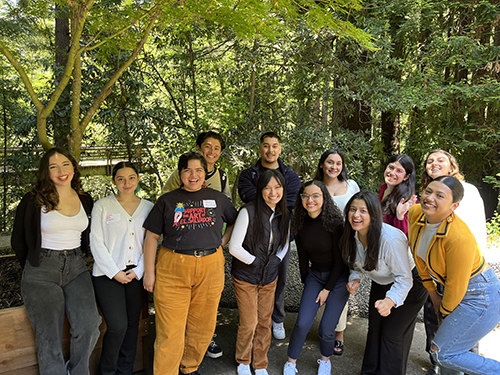Campus News
The opportunity to transform futures
With the generous support of donors, UCSC’s Institute for Social Transformation funded 12 students to pursue internships over the summer through the Transforming Futures program.

Internships are coveted opportunities for college students nationwide. Yet, unpaid internships rather than paid, disproportionately disadvantage first-generation, underrepresented, and low-income college students. UC Santa Cruz’s Institute for Social Transformation is combating that inequity, one student at a time.
In its second year, Transforming Futures—a program within the Division of Social Sciences’ Institute for Social Transformation—awarded up to $7,500 scholarship stipends to 12 students (double the amount of its inaugural year) from underrepresented backgrounds to allow them to pursue unpaid internships over the summer. The instrumental hands-on experience these students gained from their summer internships wouldn’t have been possible without financial support.
Transforming Futures’s mission is to open up opportunities and remove financial barriers for first-generation, underrepresented, and/or low-income college students at UC Santa Cruz so they can participate in career-advancing summer internships. All funds for the Transforming Futures program were made available to students through the generosity and invaluable support of MR Macgill and Ho Nam, who were attracted to the campus because of its reputation for supporting first-generation college students.
MR says she is committed to amplifying opportunities for students.
“It is clear that internships provide an important experiential learning opportunity for students to gain professional experience, build professional networks, create future career pathways, and are an important component of student success,” MR said. “But unfortunately, a number of meaningful internships are unpaid, particularly at non-profit or government organizations, and therefore are not an option for many students with limited financial resources.”
Third-year student Leslie Salgado (Kresge ’25, psychology) says it would have been impossible for her to pursue her dream internship without the support of a Transforming Futures scholarship.
“I feel very fortunate to live in a community where donors make it possible for us to immerse ourselves in this short but intense internship without worrying about financial expenses,” Salgado said. “I know that otherwise, I would have never gotten the opportunity to participate in an internship of this form, which was a very impactful and great experience.”
According to data from the National Association of Colleges and Employers 2021 Student Survey, 74% of white students said they’d had unpaid internships and 73% had paid internships, compared to 8% and 6.6%, respectively, for Black students and 10.2% and 7% for Hispanic or Latinx students. Among first-generation students, 25.6% reported they were unpaid interns, and 20.5% were paid.
“We’re called the Institute for Social Transformation,” Institute Director of Operations Evin Knight said. “So trying to offer these transformative experiences to the students, especially students who might not be able to take advantage of those opportunities otherwise, is instrumental to our identity and mission.”
Knight and Chris Benner, Director of the Institute for Social Transformation and the Everett Program for Technology and Social Change, spearheaded the debut of Transforming Futures in 2022 with the invaluable support of the Experiential Learning Team of the campus’s Career Success department. Career Success Internship Coordinator Lauren Orme was instrumental in designing the program and preparing the students to benefit the most from their internship experience. Dean of Social Sciences Katharyne Mitchell emphasized the importance of offering a program like Transforming Futures.
“I’m truly thrilled that we have been able to continue to provide this type of experience for our students,” Mitchell said. “Transforming Futures is a rare program that can change student lives in constructive and meaningful ways for the long term. I’m so grateful to everyone who makes this initiative possible.”
Career-advancing opportunities
Leslie Salgado always knew she wanted to work with kids. So when the opportunity to work with children arose this summer, she knew she had to pursue it. Salgado spent the past three months interning at Jacob’s Heart Children’s Cancer Support Services.
Jacob’s Heart provides family-centered care that addresses the emotional, practical, and financial struggles for families of children and teens during cancer treatment, families experiencing anticipatory grief, and those who are bereaved. Salgado had heard about the organization while she was a long-time volunteer at Second Harvest Food Bank.
“I got to see how important impactful organizations like these are and how important it is to have them in our community,” Salgado said. “The resources they provide for families in need make a big difference. I’ve also always known that I wanted to work with kids, so I knew that having the opportunity to work with them would be a great experience.”
As a clinical therapist intern at Jacob’s Heart, Salgado worked on updating case notes, participated in weekly meetings where challenging cases were discussed, created service fliers, did a hospital visit, and more. She says that the experience she gained allowed her to explore multiple paths in the psychology field. She is excited to pursue other internships in the future to continue exploring different paths and hopes to pursue a Master’s degree after graduating from UCSC.
Salgado emphasized that she is grateful to have participated in a program like Transforming Futures.
“I want to thank the Jacob’s Heart team, the donors, UCSC, and everyone else who made this possible for all of us.”
For information about supporting the Transforming Futures program for future participants, contact Joop Rubens, Managing Director of Development, Library and Social Sciences, at jrubens@ucsc.edu.